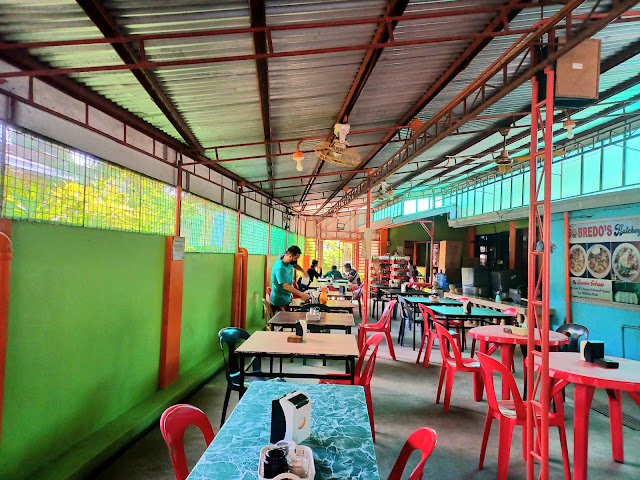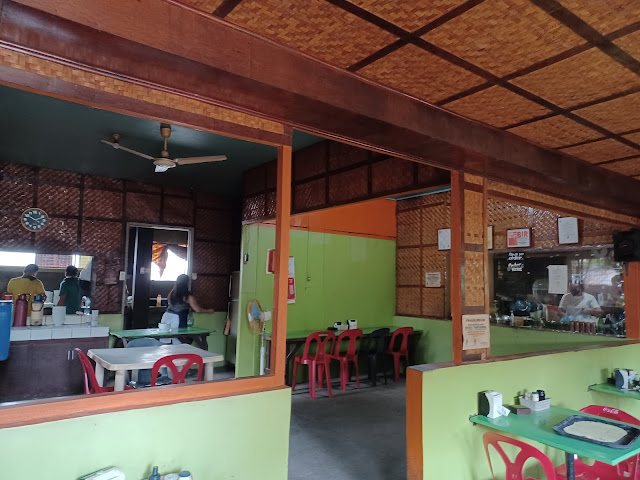It's been a while since I visited my hometown's most popular batchoyan, the viral Batchoyan ni Jasmin Sobredo in Ilawod, Santa Barbara, Iloilo.
Though I got to enjoy this semi-regularly, it's always on delivery/take-out. So out of nowhere, I just have to satisfy my cravings of having a hot and delicious bowl of La Paz batchoy…. inside a not so typical batchoyan.
If you haven't been here for a long time, you'd be glad they now have a bigger parking space and a much more welcoming main entance.
It's a testament of its success after it went viral over socmed a few years ago as they were always flooded with hungry guests - locals and tourists alike.
With a collection of plants ( borne out of the pandemic, hello plantitos and plantitas) flanking the passageway, its a respite from the hustle and bustle of regular batchoyans located inside wet markets. Not typical but Tropical batchoyan, I may add.
Upon entry, you'll already smell the aroma of the La Paz batchoy coming from the kitchen. And it's one very big batchoyan which can seat almost 100 (just assuming) - proof of it doing very well even before, during and most especially now, after the pandemic.
But mind you, its just the second extension. If wander around while waiting for your order, you'd find the first extension, which has a more local and say, native feel.
It's an off shoot of the original area where the counter and kitchen are to be found.
The counter, where you can also place your order, has an assortment of sides on display to complement your bowl of La Paz batchoy. Most popular of which is Puto from Brgy. Lanag, also in Santa Barbara. You can also have some pan de leche and pan de sal plus my personal fave - baston baston breadsticks.
Aside from its signature flavor and lots of toppings, Jasmin's batchoy popularity can also be pinpointed to its price. Ofcourse, this price point is common for those located outside the city where almost everything is a lot pricier. And don't forget to bring your own container for take out orders (for the caldo or broth).
Meet Jasmin Sobredo. I just said my hi's and hellos to not disturb her work in making my and others' batchoy orders. Most often you'd find her manning the kitchen preparing batchoy bowls in large numbers.
From placing the meke noodles to "scissoring" the pork, lover and intestines in every bowl, Jasmin also do the take outs - placing them in plastic.
And then my ordered just arrived. Yes, orders take a long time, making up the majority of the complaints I've read online, especially during peak time - usually Sunday mornings. You nay have to wait for an hour at times...
The signature taste of Jasmin Sobredo's La Paz batchoy is the broth that tends to be sweeter than most. She has her own secret recipe and it doesn't include guinamos or the local bago-ong alamang. This makes the broth last longer and stays true to its taste even at room temperature or even inside the fridge for days (yes, I've done this many times and still tastes good.)
Look at all these toppings! The real "hindi tinipid" order - pork, liver, intestines, garlic and lots of chicharon too. The egg is an additional order and you can have it fresh or hard-boiled.
For the sides, there's the delicious puto from Brgy. Lanag ( I personally prefer bread though) and something new to most - baston baston aka breadsticks. Crunchy but teeth-friendly (soft enough to break easily) and perfect to dip in the savory caldo.
I end this post with a snippet from an article from ABS-CBN NEWS Online quoting Prof. Ambeth Ocampo who has visited Jasmin's Batchoyan twice already.
No less than famed historian and gourmand Ambeth Ocampo has raved about the fairly new street-side spot which has grown popular due to online recommendations.
“Sobredo started [her] batchoy stall in a hut, with five kilos of ingredients to make a deep pot of the iconic noodle dish. [It was] was sold out by 10am,” Ocampo related in a Facebook post. “Today, she cooks 50 to 80 kilos depending on demand. It may not be the original from La Paz, but it’s one of the best I’ve tasted.”
Dali na, mamatchoy 'ta kanday Jasmin! 😋

















.jpg)